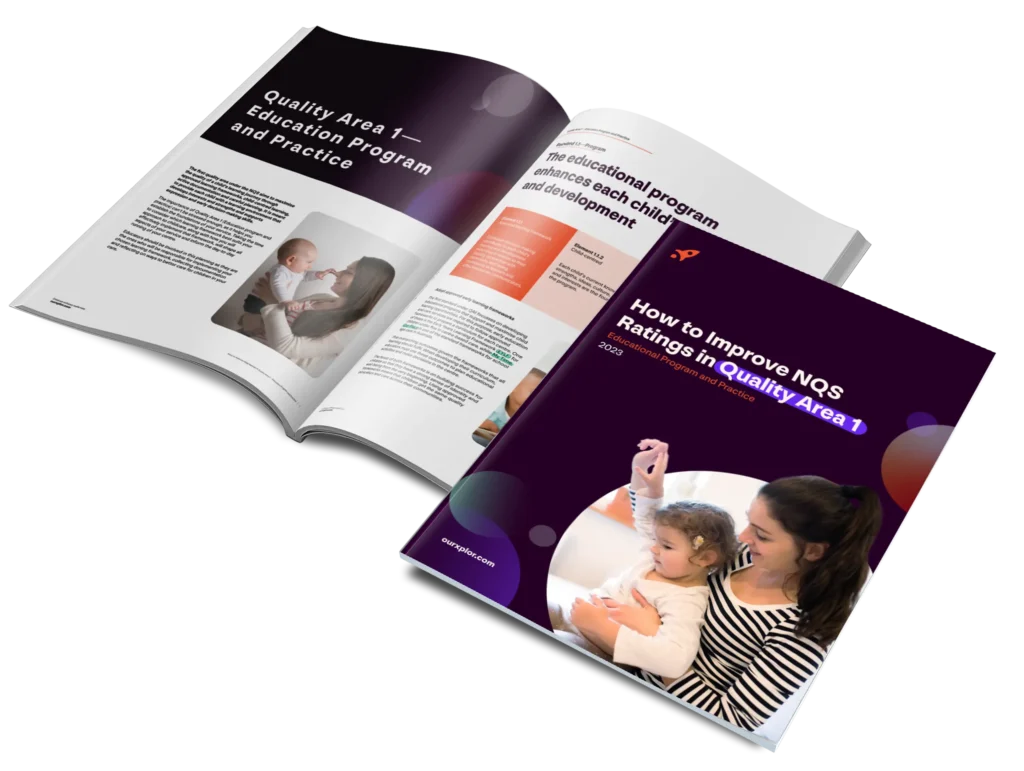This guide provides a quick reference to the acronyms most commonly used in the Australian Early Childhood Education and Care (ECEC) sector. It’s designed to help educators, administrators and service leaders quickly decode sector-specific language, government programs, funding streams and state-based initiatives.
By having these terms at your fingertips, you can navigate policies, compliance requirements and funding opportunities with greater confidence and clarity.
Government and regulatory bodies ECEC acronyms
Australia’s ECEC sector operates within a complex framework of government departments, regulatory authorities and national bodies. They set standards, provide oversight and ensure quality across services. At the national level, organisations like ACECQA maintain the National Quality Framework, while federal departments such as DEWR manage policy and funding.
State and territory governments administer their own kindergarten funding schemes, while research bodies and advocacy organisations contribute to the sector’s development and direction. This section explains the ECEC acronyms associated with the agencies and systems that govern the regulation, funding and support of ECEC services throughout Australia.
- ACARA—Australian Curriculum, Assessment and Reporting Authority
- ACECQA—Australian Children’s Education & Care Quality Authority
- ACER—Australian Council for Educational Research
- AO—Authorised Officer
- APR—ACECQA’s Annual Performance Report
- AQF—Australian Qualifications Framework
- Arrival—VIC Kindergarten Funding Scheme
- DESE—Department of Education, Skills and Employment (federal now merged into DEWR)
- DET/DoE—Formerly Department of Education & Training –> Now Department of Education
- DEWR—Department of Employment and Workplace Relations (current federal department responsible for ECEC)
- ECA—Early Childhood Australia
- ECEC—Early Childhood Education and Care
- NQA ITS—National Quality Agenda IT System
- QKFS—Queensland Kindergarten Funding Scheme
- Start Strong/The Digital Hub—NSW Kindergarten Funding Scheme
- SEIFA—Socio-Economic Indexes for Areas (used to measure disadvantage)
- SNAICC—Secretary of National Aboriginal and Islander Child Care

Is your educational program child-centred enough to meet NQS standards?
Curriculum and frameworks
The foundations of quality practice in Australian ECEC services are built on a comprehensive system of curriculum frameworks, standards and guidelines that shape how educators plan for and support children’s learning and development.
Central to this are the EYLF and MTOP—Australia’s approved learning frameworks that guide practice for different age groups. In addition, the National Quality Framework establishes the regulatory structure through the National Law, National Quality Standard and its seven quality areas.
Below, you’ll find ECEC acronyms that represent the interconnected elements that define what quality looks like in early childhood education and care. Understanding these frameworks is essential for navigating both the pedagogical and compliance aspects of ECEC work.
- CoE—Code of Ethics
- CEC Theorists—Early Childhood Education and Care Theorists
- EYLF—Early Years Learning Framework (Belonging, Being and Becoming for children aged 0 to 5)
- MTOP—My Time, Our Place (for school-aged children)
- NAPLAN—National Assessment Program – Literacy and Numeracy (more relevant to schools but often referenced)
- NL—National Law
- NMCG—National Model Code and Guidelines
- NQF—National Quality Framework
- NQS—National Quality Standard
- QA—Quality Area (under the NQS)
- QKLG—Queensland Kindergarten Learning Guideline
ECEC acronyms related to roles and qualifications
Understanding the people and pathways in ECEC requires familiarity with a range of specialised terms and qualifications. These include educators who work directly with children, like ECTs and Educational Leaders. There are also training frameworks that shape their professional development, such as the AQF and VET system. The following section breaks down the key terms you’ll encounter when discussing who does what in ECEC services and how they’re qualified to do it.

- AQF—Australian Qualifications Framework
- ECT—Early Childhood Teacher
- EL—Educational Leader
- FDC—Family Day Care
- ISP—Inclusion Support Personnel
- Kinder/Kindy—Kindergarten (referring to the government kindergarten schemes)
- LDC—Long Day Care
- OSHC/OOSH—Outside School Hours Care/Out Of School Hours care
- PS—Preschool
- RP—Responsible Person
- RTO—Registered Training Organisation
- TAFE—Technical and Further Education
- VET—Vocational Education and Training
Assessment and compliance
Maintaining quality and meeting regulatory obligations in ECEC services involves navigating a structured system of assessments, plans and compliance requirements. These operate at both national and state levels. Beyond quality measures, compliance extends to mandatory safety checks, such as the Working With Children Check, which varies in name and format across each state and territory. This section breaks down the essential ECEC acronyms you’ll encounter when managing regulatory visits, documenting improvement efforts and ensuring your ECEC service meets all legal and quality requirements.
- A&R—Assessment and Rating (visit under the NQF)
- NQF—National Quality Framework
- NQS—National Quality Standard
- PIP—Preschool Improvement Program
- QA—Quality Assurance
- QIP—Quality Improvement Plan
- RA—Regulatory Authority
- RAP—Reconciliation Action Plan
- SA—Self Assessment
- SIP—Strategic Inclusion Plan
- WWCC—Working With Children Check (state-based)
- ACT—Working With Vulnerable People Registration (WWVP)
- NSW—Working With Children Check (WWCC)
- NT—Working With Children Clearance (Ochre Card)
- QLD—Blue Card (for child-related work)
- SA—Working With Children Check (WWCC)
- TAS—Registration to Work with Vulnerable People (RWVP)
- VIC—Working With Children Check (WWCC)
- WA—Working With Children (WWC) Check

Want to connect with other professionals to help shape the sector, one conversation at a time?
Funding and reporting ECEC acronyms
Accessing government funding and managing the administrative requirements of ECEC services means working with multiple subsidy programs, digital platforms and reporting systems. At the heart of family fee relief is the Child Care Subsidy (CCS), which replaced the previous CCB and CCR systems. Targeted support is available through programs such as the Additional Child Care Subsidy (ACCS) and the Inclusion Support Subsidy (ISS) for children with additional needs. Services manage these funding streams through platforms like PRODA for secure government access. This requires a Child Care Management System (like Office) that handles enrolments, attendance and fee reporting. This section demystifies the ECEC acronyms behind how services are funded and how they meet their financial reporting obligations.
- ACCS—Additional Child Care Subsidy
- CCB—Child Care Benefit (legacy)
- CCR—Child Care Rebate (legacy)
- CCMS—Child Care Management System
- CCS—Child Care Subsidy (current federal funding system)
- IHC/IPS—In Home Care/Individualised Programs
- ISF—Inclusion Support Facilitator
- ISS—Inclusion Support Subsidy
- PAF—Preschool Access Fund
- PRODA—Provider Digital Access
Professional bodies/networks
Beyond government regulation and funding, the ECEC sector is supported by a network of professional organisations and advocacy bodies that provide resources, represent workforce interests and champion quality practice. These organisations play a vital role in connecting educators, sharing knowledge and ensuring diverse voices shape the future of early childhood education and care in Australia.
If you need further assistance or would like to see how Xplor Education can help you streamline admin at your ECEC service, please get in touch with us.

You might also be interested in…

Blog
The National Model Code—safe practices for early childhood education and care services
For early childhood education and care (ECEC) services, sharing pictures and videos of children with families is a daily practice. ….
Read more

Blog
Navigating Change: A Closer Look at the Updated National Learning Frameworks
The scope of early childhood education and care within Australia is ever evolving. It is essential for the sector to ….
Read more

Blog
Office—childcare management software that saves you time
Childcare management is a complex task involving numerous administrative responsibilities and coordination between administrators, educators and families. Xplor Education is ….
Read more

by Dean Comeau (Marketing Team Lead)
-
First published: 09 October 2025
Written by: Dean Comeau
